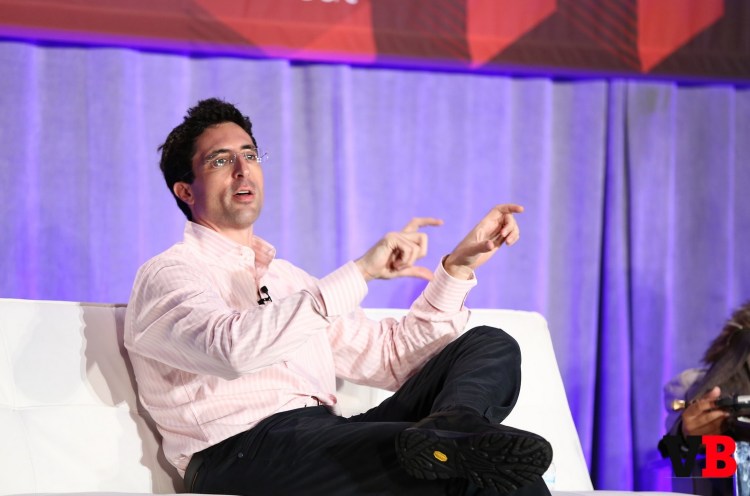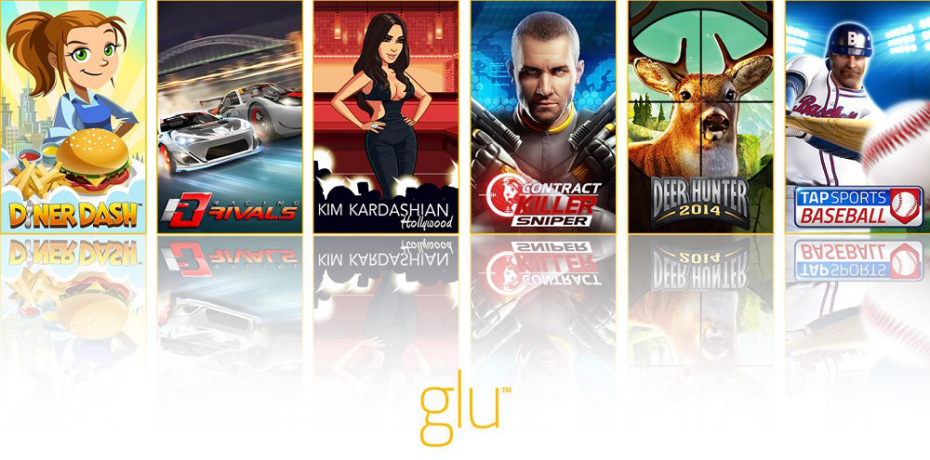GamesBeat: When you look at the top three grossing games on the app stores — you find they have a lot fewer games. I wonder how long that situation is going to last. Does it make you consider the strategy in a different way, in terms of doing a portfolio of games, having a bunch of games?
De Masi: We’re leaning into the celebrity pipeline, largely because of this suppression of installs in the top free charts that we’ve seen in the last year. Some people can spend a lot of money, effectively acquiring users, to use our favorite vernacular. Paid marketing spend. You’ve seen, in some ways, fewer games in the top 100 free apps than any time in the past five years. Certainly on the Apple charts. Some of that might be that we’re not surprising and delighting audiences to the same extent as we once did. Some of it is due to the people who can spend large amounts of money on high-LTV installers and so on.
One of the reasons why we like the celebrity partnerships is that we get, effectively, a permanent marketing asset. Unlike a movie IP, where there isn’t much social following, if you partner with someone who has 100 million social followers, you have built-in promotion. I’m expecting we’ll be able to see all of our celebrity games do well in the top free charts than they would otherwise.
GamesBeat: You just launched James Bond: World of Espionage. What’s the thinking there? How does it compare and contrast with Kim Kardashian?
De Masi: Quite a contrast. That game has been two years in the making. It was done at the same time as our Terminator and Mission Impossible deals, as well as the Kim Kardashian game. Think back to late 2012 and early 2013.
A lot of thought went into these movie partnerships. The Kim partnership was an experiment for Glu, along with our movie partnerships, to take a tried and tested game engine and find a way to increase reach. Drive more installs, hopefully get some uptick in conversions, maybe even retention, via the brand affinity in the IP.
What we’ve seen pretty clearly in three movie titles, as well as the Kim game, is that there’s much better affinity between a living, breathing person with an in-built digital promotion mechanism than there is with even the world’s most successful movie franchises. Our conclusion from that whole portfolio strategy has been that celebrity is more effective than movie IP, generally speaking. You’ll see us lean accordingly into the road map over the next couple of years.
GamesBeat: How do you balance the financials here, between the IP owners and yourselves?
De Masi: We balance them by trying to give them as little of the pie as possible, right? But the reality is, you want an incentive partner. We haven’t disclosed exact royalty shares with Kim or any of our partners, but if you look at our quarterly results, you can see that we’re paying 10, 11, 12 percent of our revenues in royalties every quarter. Something like that. You can work out how much of our game portfolio is branded versus original IP. We own the Deer Hunter IP. We own the Diner Dash IP. We don’t pay royalties on those.
Kim’s making up a big chunk of that. You can see an imputed royalty rate, which is a modest, but significant minority. Having a partner who, if we’re successful, can effectively see one of their top three income streams come from a game, that makes for a very different dynamic than, say, a film, where it can make a billion dollars at the box office. Unless the game makes half of that, the prioritization isn’t there. For Kim, we’re a top two, top three income stream if we’re successful.
I very much hope the same will be the case with our musician partners, who have of course seen paid music, physical music, go into decline. Katy Perry’s making her money on performances, merchandising, sponsorship. Gaming can be on the podium, in her top three, if we’re successful.
GamesBeat: James Bond games went through their cycle. At the beginning of shooters, like with GoldenEye, they were brilliant games. But they also ran out of gas at some point. I wonder how you keep gamers interested in these branded games.
De Masi: Surprise and delight was something I mentioned earlier as something our industry needs to push harder. Unless Apple has changed their top free algorithm, you see dramatically fewer games in the top three free apps in the last year. Certainly fewer than we had three or four years ago. Part of it might be that consumers are spending all their time on social messaging and social networking apps. Or it might be that we’re not doing our job as an industry at finding something innovative and getting it through.
I think that’s the case. We have to build a game that surprises and delights and innovates, whether it’s with celebrity partners or with our own IP or with film. The only difference is whether you get a marketing boost through some kind of external factor. If you’re working with something that otherwise has great marketing, that has some other kind of established brand.
With VR and AR, I’m sure you’ve heard a lot about that at this conference, and you’ll hear a lot more in the next day. That might be the next generation of surprise and delight. That’s going to be awesome, if we can bring VR and AR tech to celebrity games, to movie titles, to everything out there.
GamesBeat: What do you see as the road ahead for mobile games?
De Masi: I see it very much like the cable TV sector, in the sense that I believe that everyone in this industry has to be very sharp at identifying what their demographic is and trying to engage and finding a way of programming for that. We’re going to see more and more depth and more and more competition. We have, what, 1.5 million apps in the stores now, heading toward two million? Volume is going to keep increasing. Specificity will keep increasing as well.
We’ll see the biggest mobile game companies being great at all those bottom-of-the pyramid aspects of functional success. They’ll have great analytics, great marketing, great core gameplay. They’ll understand monetization. What will make the difference is innovation. And in the next five years you’ll see more hardcore monetization mechanisms come into the casual space.
GamesBeat: Taking a look at what you’ve been building here, what’s the one celebrity you really want to pick up?
De Masi: There’s a great number of celebrities that we’ve possibly signed. If you work your way down the list of the most popular people in the world — by most popular I mean 100 million followers or more. There are some sporting stars — Cristiano Ronaldo, Lionel Messi, David Beckham is up there — men that have big followings. Vin Diesel is up there. There’s also some musicians that have huge followings. Taylor Swift, nearly 200 million social followers. One Direction.
Our challenge is working with partners who want to build a game, who have a big social following, and with whom we can find a way to build a game that resonates with their fanbase. If Ronaldo wants a game, but he wants it to be a lifestyle game, it’s not clear that that’s what gaming audiences will want. Do you want to interact with a LeBron James who’s dunking, or who’s in the locker room talking about how his shorts are too tight? That’s probably not the brand affinity connection you want.
It’s not as simple as just signing the biggest names. You have be thoughtful about making sure they want to partner with you. The game won’t be successful if they’re not able to engage their fanbase and connect it with the innovation in the mechanics. They won’t promote it as heavily. They won’t make as much money. There’s a known virtuous circle that happens if it all comes together.
GamesBeat: Your goal is a billion followers. How soon do you think you can get to a billion followers behind Glu games?
De Masi: I said on our analyst day that it would happen by 2020. We were at 434 million on May 13. We were at 650 million signed on the Q2 earnings call a couple of months ago. I suspect that we will get them signed much faster than the analyst day predictions. When the games come out, though, will be a rolling feast. Believe it or not, we’re increasingly capacity constrained. We can’t build as many games as we have inbound interest.
We’re very choosy. I get emails daily from someone who has five million, 10 million, 30 million followers. We’re not going to build a game for someone with that many followers. 100 million is the line now. We’re able to be that choosy. It’s a space that’s had a lot of validation on the install front. Demi Lovato’s had a game. Meek’s had a game. Eminem’s had a game. Various people have had games over the last five years. They all download. Whether you can monetize or not becomes the question.
We have an engine that does a good job of that. We want to make sure we take advantage of that going forward. But we recognize that we have to innovate and surprise and delight. Otherwise we won’t be able to support as many concurrent games.
GamesBeat: My money is on Kanye West or Kara Swisher.
De Masi: Your money’s on Kanye or Kara? Depends on who runs for president first. We also have mechanisms to add additional celebrities into existing games, though. Kim has her whole family in there. It’s a good way of testing out the gaming affinity. We’re adding a bunch of fashion stars to Kim’s game as we add more branded items. We’re very much scratching the surface of where these games can go, if you think about them as e-commerce platforms as well as sponsorship and merchandising platforms, and of course, taking interactive entertainment to the next level.
VentureBeat's mission is to be a digital town square for technical decision-makers to gain knowledge about transformative enterprise technology and transact. Learn More





